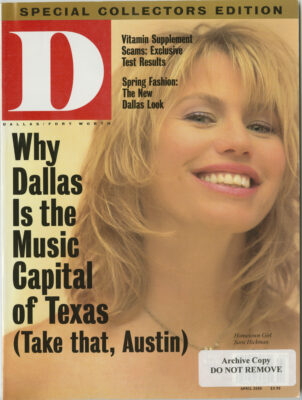FRIDAY AFTERNOON, AND WHOLE FOODS Market at Coil and Beltline in Richardson is buzzing with activity. As we wait in line with our five bottles, Dallas consumers happily plop down their money for dietary supplements and so-called “naturoceuticals.” Our fellow purchasers are not alone. Over the past few years, the market for such herbal remedies has exploded-today, the market’s value is put close to 54 billion. One supplement, St. John’s wort-virtually unknown until 1998 when an ABC 20/20 story increased sales 100 times-is the cause of much of the boom. (In 1998 about $400 million of St. John’s wort alone was sold in the US.)
But what do most consumers know about the products they’ve spent billions on? What do our fellow line-waiters know? Unfortunately, very little. The products are unregulated. Thanks to the Dietary Supplement Health and Education Act of 1994, approval by the FDA is not required for herbal supplements.
So we decided to find out for ourselves just what the most popular supplements contain.
D Magazine went to five area stores-Tom Thumb, Whole Foods. Drug Emporium, GNC, and Fresh Start-to compare the most popular supplements available. At each store we bought three identical bottles of DHEA, ginger, ginkgo biloba, ginseng, melatonin, saw palmetto, St. John’s wort, and milk thistle.
The products were fully analyzed by Dewes Research Laboratories in Mineral Wells. Formerly a pharmaceutical company. Dewes now serves as an FDA reference for making these supplements. Although several scientific methods of testing a product’s potency exist, Dewes’ method is considered so reliable that the FDA has requested a copy of our test results for its research into the industry.
The Dewes team checked that the bottles were sealed correctly. They smelted and observed the contents, inspecting for anything out of place. And they chemically tested the supplements, seeing if enough active ingredients were present to cause the product to work.
Dewes wasn’t surprised by the results. Of the forty products we tested, almost half didn’t meet their label claims. Five products contained no active ingredients-for example, in a bottle of ginseng, there was no ginseng herb at all. You may as well have a glass of water.
As these results clearly show, each year thousands of Dallasites play a guessing game when purchasing supplements. And, unfortunately, the procedures in place to advise local consumers are as varied as the supplements themselves.
At Fresh Market on Oak Lawn, manager Casey Rose responds to each customer’s questions differently, he says. Rose advises certain customers to talk with their doctor, and has no problem recommending certain brands. “I have a lot of confidence in Solgar since they’ve been in business since 1947,” Rose says. “There “s a whole lot of reasons why llike them-they don’t take any shortcuts in their manufacturing. They’re the Cadillac of the vitamin industry.”
But across town Leska Gilbert, a buyer for Whole Foods, is prohibited by company policy from giving customers any guidance in choosing the products right for them. “It’s very frustrating both for us and for customers because it’s that much harder for us to help them,” says Gilbert. “That leaves il all open-people can abuse the system. We aren’t allowed to talk to people. T don’t ever try to say, ’This is the one you want.’”
Instead, Gilbert shows her customers a stack of large reference books with a listing of supplements and lets them do the research. She can’t even point to individual products in the large volumes. And, if customers are looking for a certain product to cure an ailment (like hepatitis), she cannot help them at all. Amrion, the company that makes the Whole Foods store brand of supplements, advises employees on how to respond to unanswerable questions from customers, like ” Will this product help me with XYZ?” Which raises the question, how can uninformed consumers effectively choose the right brand if their salesperson can’t even help them?
For any salesperson it is a difficult position to be in. “1 think we have to police our own industry,” Rose says. “We’ve got to be responsive, educate ourselves, and help our consumers get educated.”
Perhaps Rose needs a little education himself. Remember his endorsement of Solgar. “the Cadillac of the vitamin industry”? Solgar performed the worst of any brand we tested.
Back at Whole Foods, shoppers are still shelling it oui for the remedies. One man browsing in the supplement section focuses on the men’s health area. He points timidly at a black bottle with a gold-em bossed snake, called Cobra. “We know what that one does,” he grins sheepishly. But do we?
Each bottle’s label may bear the familiar disclaimer: “This statement has not been evaluated by the Food and Drug Administration. This product is not intended to diagnose, treat, cure, or prevent any disease,” but despite the warnings and lack of regulation, we’re gobbling them up. Aquick look at some of the claimed benefits, and you can see why: ginseng will increase your sexual stamina, melatonin helps you sleep, cranberry helps your urinary tract, and ginkgo biloba increases your mental prowess. The logic seems simple enough: Take this nalural supplement and improve your health. Unfortunately, it’s not that simple at all. A supplement’s potency can vary drastically from bottle to bottle, And many do. The law allows supplement makers certain loopholes in the way they promote their products. The FDA controls all labeling and flyers-manufacturers cannot say their product helps with a certain disease, but only a “structure or function” of the body. St. John’s wort cannot be described as an anti-depressant, but it can be marketed as a mood enhancer or energizer. Manufacturers cannot claim saw palmetto can treat an enlarged prostate, but they can say the herb is helpful in maintaining a healthy prostate. It’s all about semantics.
So how can customers ensure that the supplement in their shopping cart will work as its supposed to?
’They can’t,” says Dr. Stephen Barren, a Columbia-educated and retired psychiatrist. Dr. Barrett’s popular website. Quackwatch (www.quackwatch.com), is aimed at educating consumers about the real benefits of many of the products they buy. The site gets about 1.000 hits daily. “Most people think that dietary supplements and herbs are closely regulated to ensure that they are safe, effective, and truthfully advertised,” Dr. Barrett says. “Nothing could be further from the truth.”
DHEA
CALL DHEA YOUR DO-IT-ALL PILL-NEWS reports have touted it the “mother of all hormones.” At least, that’s what its manufacturers want you to call the 25 mg pills. DHEA is short for dehydroepiandrosterone. a steroid hormone like testosterone; it’s made by your adrenal glands, but production slows down once you reach your 30s. The claimed benefits range from preventing cancer or heart disease to helping you live longer or lose weight, Gilbert says DHEA took off about three years ago. and Whole Foods just began carrying it this year. The store posts warnings next to bottles on the shelves, telling pregnant mothers and shoppers with serious illnesses to stay away.
Dr. Robert Homsby. an associate professor of cell biology at Baylor College of Medicine, is one of the leading experts on the hormone. He and his team are studying DHEA extensively and warn people not to use it until it’s safe for consumer use.
“It’s classified as a dietary supplement, which it isn’t,” Dr. Homsby says. “DHEA should be classified as an investigational drug and used only in clinical research until we figure out what it does and its side effects.”
Dewes’ team found proper amounts of the DHEA’s active ingredient in all our products. But DHEA Powder, a Nature’s Herb brand bought at Whole Foods, also claimed to have 375mg of Siberian ginseng mixed in with the DHEA. Test after test, Dewes found the bottles lacking any trace of ginseng at all.
GINGER
ONE OF THE OLDER HERBS STILL ON THE MAK-ket. manufacturers want you lo believe that ginger relieves nausea and helps pregnant mothers deal with morning sickness. Some studies have compared the herb’s effects to Dramamine. The Journal of the American College of Cardiology warns that ginger might interfere with anticoagulants, blood thinners that prevent blood from clotting.
All five of our products met or exceeded their label claims. The GNC product initially appeared not to meet its label claims. But Dewes found that the ginger extract in the GNC bottle was a stronger strength than the others-strong enough to ensure the product lives up to its label claims.
GINKGO BILOBA
ONE MAKER OF GINKGO CLAIMS THAT IT “increases mental prowess.” Dr. Barrett begs to differ.
“That’s a false claim,” he says. “It does increase circulation to the brain.” But whether that blood flow can cause you to think faster or more clearly, says Barrett, no one knows. Barrett also says that ginkgo mixed with other medicines may be a bad combination-there have been reports, he says, that, when taken with aspirin, your eyes will bleed. Again, the Journal of the American College of Cardiology warns of interference with anticoagulants.
Both the Solgar brand from Fresh Market and the Top Care brand from Tom Thumb did not meet their label claims. The three other products we tested all passed our tests.
GINSENG
LIKE GINGER, GINSENG HAS BEEN AROUND for a while. Manufacturers claim that ginseng will give you more energy and increase your sexual stamina. We found problems with three of our five ginseng brands. Both the Solgar bottle from Fresh Market and the popular Centrum brand from Tom Thumb were totally absent of Ginsenosides, the active ingredient. These products, in bottle after bottle, were completely lacking ginseng.
But even more shockingly, one of our Whole Foods bottles contained the bacteria Streptococcus inside the pills. Subsequent tests revealed the second and third bottles from Whole Foods were clear. Although the bacteria count was low. Dewes says it’s possible that someone with a compromised immune system could contract strep throat from the pills.
MELATONIN
A HORMONE PRODUCED INSIDE YOUR BRAIN, melatonin production peaks at puberty and declines from there. Millions of Americans take it to help them sleep, cure insomnia, or relieve jet lag. Pills range in dose from 1 mg to 3 mg, withatime-releasecomponenibuiltin,soyour body absorbs it over a number of hours. A popular version of this herb is a sublingual pill, or one you can put under your tongue. Gilbert says that your body absorbs a sublingual pill faster than if you swallow a tablet. Manufacturers claim their product is almost identical to the natural melatonin your pineal gland produces. But Dr. Barre? isn’t so sure.
“It probably does work as a sleeping pill, but whether ils long-term use is safe is unsettled,” Dr. Barrett says. “And there’s some reason to believe it might not be safe.”
Even so, all five of our products checked out with no problems of any kind-this was the most reliable product we tested.
MILK THISTLE
FOUR OF OUR FIVE PRODUCTS LIVED UPTO THEIR label claims-only Nature’s Bounty, bought at Tom Thumb, lacked the active ingredient.
SAW PALMETTO
THE JOURNAL OF THE AMERICAN COLLEGE OF Cardiology notes that possible cardiac side effects of saw palmetto include edema, or swelling, usually of the legs. Increasingly, men are taking saw palmetto to ease their “symptoms of an enlarged prostate.” Dr. Barrett says that doctors just don’t know enough about it to safely urge their patients to take it. “I don’t think it’s been studied enough” he says.
Both Sundown’s product from Drug Emporium and Solgar’s from Fresh Market failed our tests. The Solgar brand contained less than half of the free fatty acids it would need to meet its label claim.
ST. JOHN’S WORT
WIDELY CLAIMED TO BE AN EFFECTIVE ANTI-depressanl, St. John’s wort has been the subject of numerous newspaper and magazine articles over the past few years. But for all its attention, relatively few medical studies have been done. And of those, says Dr. Barrett, none have lasted long enough to know the long term danger or true effectiveness of St. John’s wort.
“There is no published evidence that St. John’s wort is effective against severe depression, which, in any case, should receive professional help,” Barrett says. The Journal of the American College of Cardiology warns that it might interact with diuretics, medications that promote water loss.
Of the five products we tested, only the GNC store brand checked out with no problems. Solgar’s brand from Fresh Market and Sundown Herbs’s bottle from Drug Emporium had no active ingredient at all, despite repeated testing. In Whole Foods’ store brand, 23 percent of all capsules were not completely closed, therefore impeding proper time-release. In our tests. Whole Foods’ brand and Tom Thumb’s store brand. Top Care, came up short in active ingredients.
Get our weekly recap
Brings new meaning to the phrase Sunday Funday. No spam, ever.
Related Articles

Media
Will Evans Is Now Legit
The founder of Deep Vellum gets his flowers in the New York Times. But can I quibble?
By Tim Rogers

Restaurant Reviews
You Need to Try the Sunday Brunch at Petra and the Beast
Expect savory buns, super-tender fried chicken, slabs of smoked pork, and light cocktails at the acclaimed restaurant’s new Sunday brunch service.

Arts & Entertainment
DIFF Preview: How the Death of Its Subject Caused a Dallas Documentary to Shift Gears
Michael Rowley’s Racing Mister Fahrenheit, about the late Dallas businessman Bobby Haas, will premiere during the eight-day Dallas International Film Festival.
By Todd Jorgenson


